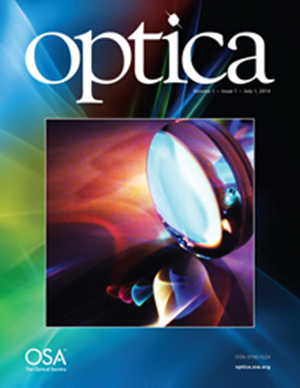通过硬件感知训练和剪枝实现免控制高效集成光子神经网络
IF 8.5
1区 物理与天体物理
Q1 OPTICS
引用次数: 0
摘要
集成光子神经网络(PNN)利用光的独特特性,如大带宽、低延迟和潜在的低功耗,走在了人工智能计算的前沿。然而,集成光学元件本身对外部干扰、热干扰和各种器件缺陷非常敏感,从而对计算精度和可靠性造成不利影响。传统的解决方案使用复杂的控制方法来稳定光学器件和芯片,导致硬件复杂度高,对大规模 PNN 不切实际。为了解决这个问题,我们提出了一种训练方法,在不增加硬件复杂性的情况下,实现无控制、精确和节能的光子计算。其核心思想是训练物理神经网络的参数,使其趋向于噪音低、能效高的区域。我们的方法在不同的集成 PNN 架构上得到了验证,并适用于解决热调整 PNN 和基于相变材料的 PNN 中的各种设备缺陷。基于微环谐振器的 PNN 实现了显著的 4 位改进,而无需复杂的器件控制或耗电的温度稳定电路。此外,我们的方法还将能耗降低了十倍。这一进步标志着我们在实现大规模集成 PNN 的实用、节能和抗噪方面迈出了重要一步。本文章由计算机程序翻译,如有差异,请以英文原文为准。
Control-free and efficient integrated photonic neural networks via hardware-aware training and pruning
Integrated photonic neural networks (PNNs) are at the forefront of AI computing, leveraging light’s unique properties, such as large bandwidth, low latency, and potentially low power consumption. Nevertheless, the integrated optical components are inherently sensitive to external disturbances, thermal interference, and various device imperfections, which detrimentally affect computing accuracy and reliability. Conventional solutions use complicated control methods to stabilize optical devices and chip, which result in high hardware complexity and are impractical for large-scale PNNs. To address this, we propose a training approach to enable control-free, accurate, and energy-efficient photonic computing without adding hardware complexity. The core idea is to train the parameters of a physical neural network towards its noise-robust and energy-efficient region. Our method is validated on different integrated PNN architectures and is applicable to solve various device imperfections in thermally tuned PNNs and PNNs based on phase change materials. A notable 4-bit improvement is achieved in micro-ring resonator-based PNNs without needing complex device control or power-hungry temperature stabilization circuits. Additionally, our approach reduces the energy consumption by tenfold. This advancement represents a significant step towards the practical, energy-efficient, and noise-resilient implementation of large-scale integrated PNNs.
求助全文
通过发布文献求助,成功后即可免费获取论文全文。
去求助
来源期刊

Optica
OPTICS-
CiteScore
19.70
自引率
2.90%
发文量
191
审稿时长
2 months
期刊介绍:
Optica is an open access, online-only journal published monthly by Optica Publishing Group. It is dedicated to the rapid dissemination of high-impact peer-reviewed research in the field of optics and photonics. The journal provides a forum for theoretical or experimental, fundamental or applied research to be swiftly accessed by the international community. Optica is abstracted and indexed in Chemical Abstracts Service, Current Contents/Physical, Chemical & Earth Sciences, and Science Citation Index Expanded.
 求助内容:
求助内容: 应助结果提醒方式:
应助结果提醒方式:


